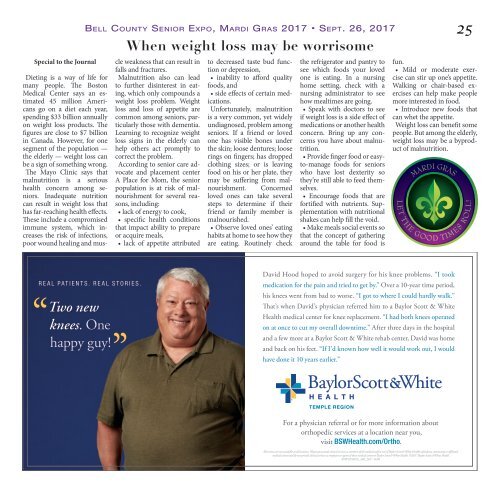Bell County Senior Expo 2017
A guide to the vendors and services on display at the Bell County Senior Expo.
A guide to the vendors and services on display at the Bell County Senior Expo.
You also want an ePaper? Increase the reach of your titles
YUMPU automatically turns print PDFs into web optimized ePapers that Google loves.
Special to the Journal<br />
<strong>Bell</strong> <strong>County</strong> <strong>Senior</strong> <strong>Expo</strong>, Mardi Gras <strong>2017</strong> • Sept. 26, <strong>2017</strong> 25<br />
When weight loss may be worrisome<br />
Dieting is a way of life for<br />
many people. The Boston<br />
Medical Center says an estimated<br />
45 million Americans<br />
go on a diet each year,<br />
spending $33 billion annually<br />
on weight loss products. The<br />
figures are close to $7 billion<br />
in Canada. However, for one<br />
segment of the population —<br />
the elderly — weight loss can<br />
be a sign of something wrong.<br />
The Mayo Clinic says that<br />
malnutrition is a serious<br />
health concern among seniors.<br />
Inadequate nutrition<br />
can result in weight loss that<br />
has far-reaching health effects.<br />
These include a compromised<br />
immune system, which increases<br />
the risk of infections,<br />
poor wound healing and muscle<br />
weakness that can result in<br />
falls and fractures.<br />
Malnutrition also can lead<br />
to further disinterest in eating,<br />
which only compounds a<br />
weight loss problem. Weight<br />
loss and loss of appetite are<br />
common among seniors, particularly<br />
those with dementia.<br />
Learning to recognize weight<br />
loss signs in the elderly can<br />
help others act promptly to<br />
correct the problem.<br />
According to senior care advocate<br />
and placement center<br />
A Place for Mom, the senior<br />
population is at risk of malnourishment<br />
for several reasons,<br />
including:<br />
• lack of energy to cook,<br />
• specific health conditions<br />
that impact ability to prepare<br />
or acquire meals,<br />
• lack of appetite attributed<br />
to decreased taste bud function<br />
or depression,<br />
• inability to afford quality<br />
foods, and<br />
• side effects of certain medications.<br />
Unfortunately, malnutrition<br />
is a very common, yet widely<br />
undiagnosed, problem among<br />
seniors. If a friend or loved<br />
one has visible bones under<br />
the skin; loose dentures; loose<br />
rings on fingers; has dropped<br />
clothing sizes; or is leaving<br />
food on his or her plate, they<br />
may be suffering from malnourishment.<br />
Concerned<br />
loved ones can take several<br />
steps to determine if their<br />
friend or family member is<br />
malnourished.<br />
• Observe loved ones’ eating<br />
habits at home to see how they<br />
are eating. Routinely check<br />
the refrigerator and pantry to<br />
see which foods your loved<br />
one is eating. In a nursing<br />
home setting, check with a<br />
nursing administrator to see<br />
how mealtimes are going.<br />
• Speak with doctors to see<br />
if weight loss is a side effect of<br />
medications or another health<br />
concern. Bring up any concerns<br />
you have about malnutrition.<br />
• Provide finger food or easyto-manage<br />
foods for seniors<br />
who have lost dexterity so<br />
they’re still able to feed themselves.<br />
• Encourage foods that are<br />
fortified with nutrients. Supplementation<br />
with nutritional<br />
shakes can help fill the void.<br />
• Make meals social events so<br />
that the concept of gathering<br />
around the table for food is<br />
fun.<br />
• Mild or moderate exercise<br />
can stir up one’s appetite.<br />
Walking or chair-based exercises<br />
can help make people<br />
more interested in food.<br />
• Introduce new foods that<br />
can whet the appetite.<br />
Weight loss can benefit some<br />
people. But among the elderly,<br />
weight loss may be a byproduct<br />
of malnutrition.<br />
REAL PATIENTS. REAL STORIES.<br />
‘‘<br />
Two new<br />
knees. One<br />
happy guy!<br />
’’<br />
David Hood hoped to avoid surgery for his knee problems. “I took<br />
medication for the pain and tried to get by.” Over a 10-year time period,<br />
his knees went from bad to worse. “I got to where I could hardly walk.”<br />
That’s when David’s physician referred him to a Baylor Scott & White<br />
Health medical center for knee replacement. “I had both knees operated<br />
on at once to cut my overall downtime.” After three days in the hospital<br />
and a few more at a Baylor Scott & White rehab center, David was home<br />
and back on his feet. “If I’d known how well it would work out, I would<br />
have done it 10 years earlier.”<br />
For a physician referral or for more information about<br />
orthopedic services at a location near you,<br />
visit BSWHealth.com/Ortho.<br />
All services are not available at all locations. Physicians provide clinical services as members of the medical staff at one of Baylor Scott & White Health’s subsidiary, community or affiliated<br />
medical centers and do not provide clinical services as employees or agents of those medical centers or Baylor Scott & White Health. ©<strong>2017</strong> Baylor Scott & White Health.<br />
BSWTEMPLE_480_<strong>2017</strong> SOM


